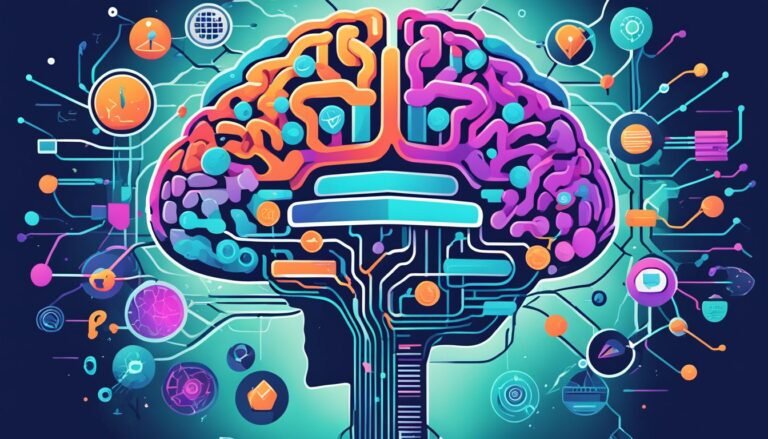AI and the Automation of Administrative Tasks in Sales and Marketing
Ever wish you had more time to focus on selling and making money? Sick of wasting time on tasks that could be done automatically? Sales and marketing move quickly, and working efficiently is crucial. Artificial intelligence (AI) and automation can be game-changers here. They can revolutionize how you handle admin tasks and sell more effectively. Let’s dig into how AI can streamline sales operations and make your life easier.
Key Takeaways:
- AI and automation offer significant benefits in sales and marketing.
- By automating administrative tasks, you can save time and focus on selling.
- AI tools learn from data and make predictions, optimizing sales processes.
- With AI, you can personalize sales efforts and access real-time data.
- AI is not here to replace sales reps, but to assist and enhance their efficiency.
What is AI in Sales?
AI in sales uses smart technology to boost sales. It uses algorithms to sort through lots of data quickly. With these tools, tasks are easier, predictions are more accurate, and conversations with people get better.
This technology changes the way sales work, making them smoother and smarter. It handles boring tasks so sales teams can do what they’re best at. They build better relationships, spot new chances, and seal deals faster, thanks to AI.
AI in sales does a lot, from finding potential customers to predicting future sales. It cuts down on time and effort, making sales teams better at their jobs. By using AI in sales, companies can grow faster, make customers happier, and earn more money.
“AI in sales is a transformative technology that streamlines and optimizes the sales process.”
Benefits of AI in Sales:
- Improved sales productivity and efficiency
- Enhanced customer experiences through personalization
- Automated lead generation and qualification
- Accurate sales forecasting and planning
- Real-time sales analytics and insights
- Streamlined sales processes and workflows
- Increased sales revenue and profitability
AI changes how businesses reach their sales goals. It helps them compete better and deal with changes in the market.
AI in Sales Use Cases:
| Use Cases | Description |
|---|---|
| Lead Scoring | AI algorithms analyze customer data to prioritize leads based on their likelihood to convert. |
| Sales Forecasting | AI models predict future sales based on historical data, market trends, and other relevant factors. |
| Chatbots | AI-powered chatbots automate customer interactions, providing instant support and assistance. |
| Predictive Analytics | AI algorithms analyze data to identify patterns and trends, enabling proactive decision-making. |
| Sales Process Automation | AI automates repetitive sales tasks, freeing up time for sales reps to focus on selling. |
AI can do a lot in sales, from grading leads to making better guesses about future sales. There’s so much AI can help with, and each business can find ways to use AI that fit their needs best.
The Need for Automation in Sales
A big part of a sales rep’s job is doing paperwork and going to meetings. This takes time away from finding leads and selling. Tasks like entering data, making reports, and organizing schedules can be slow and repeat often. So, using automation in sales can help by making these jobs faster.
Artificial intelligence (AI) presents an opportunity to make sales better by handling these tasks. With AI, salespeople can use special technology to sort out basic jobs like analyzing data, grading leads, and keeping in touch with clients. This way, they have more time to focus on making deals, building relationships, and bringing in money.
Business leaders have recognized the value of AI in sales. In fact, studies have shown that AI is considered a valuable sales tool, and the market for AI-powered platforms is predicted to grow significantly in the coming years.
Using AI for automation has many benefits for businesses. It cuts down on tasks that waste time, letting sales teams spend more time making money. It also helps make more accurate sales plans by looking at a lot of data and spotting trends. This smart approach helps salespeople make better choices and change their strategies when needed.
Another plus of automated sales is that it makes salespeople happier with their jobs. They don’t have to do boring jobs over and over; they can do work that really makes a difference. This makes the team work better together, keeps them around for longer, and makes the workplace a nicer place.
Furthermore, automation in sales allows for greater flexibility and scalability. As companies get bigger, so can their automated systems. They can handle things like finding new leads, studying data, and helping sales, all without losing quality. This lets businesses grow smoothly without a drop in their sales efforts.
The increasing need for automation in sales is evident in today’s competitive market. Companies that use AI and automation do better by running their sales more efficiently and making the most of their resources. As technology keeps getting better, using AI in sales will only get more important.
| Benefits of Automation in Sales | Implications |
|---|---|
| Increased efficiency | Enhanced productivity, reduced time spent on administrative tasks |
| Accurate sales planning and prediction | Strategic decision-making, better forecasting |
| Improved job satisfaction | Higher employee engagement, reduced turnover rates |
| Flexibility and scalability | Adapting to organizational growth, optimizing resources |
To keep up with the changing sales world, businesses need to use automation. With AI technology and automation tools, sales teams can work smarter, faster, and do better than before.
The Benefits of Artificial Intelligence and Automation in Sales
Artificial intelligence and automation are changing how we sell things. They offer big benefits, boosting efficiency, productivity, and money earned. They help sales teams do better, giving them a cutting edge in the market.
Improved Efficiency and Streamlined Processes
AI and automation help a lot by making things run smoother. They handle tasks that are boring or take too much time, like entering data or making reports. This lets salespeople spend their time better, like finding new customers or closing sales. As a result, they work more efficiently, bringing in more money and getting better results.
Accurate Sales Planning and Prediction
Thanks to AI tools and smart analysis, sales teams can understand customers better. They use data to see what customers do and want, helping them plan sales better. This means they can pick the right strategies and predict sales more accurately. It makes their decisions smarter and their sales plans more effective.
Elimination of Time-Consuming Administrative Tasks
AI and automation save salespeople from boring tasks that eat up their time. They can use AI tools for things like filling out data, following up on leads, and scheduling. This saves a lot of time and keeps everything organized. With the boring stuff out of the way, salespeople can focus on what really matters: building relationships and making money.
Increase in Job Satisfaction
AI and automation make salespeople’s jobs more satisfying. They take care of the dull tasks, allowing sales teams to focus on customers and closing sales. This makes their work more meaningful and fulfilling. They also have more time for learning and getting better at their job. It helps them succeed and do well in a tough market.
To sum up, AI and automation are great for sales. They make things more efficient, accurate, and enjoyable. They give sales teams an edge, helping them succeed and grow in today’s market.
5 Ways Your Team Can Use AI in Sales
AI in sales can change how you work for the better. It helps your team work smarter, engage customers better, and boost sales. Here are five ways to use it:
Data Enrichment and Analysis
With AI tools, you can dive deep into customer data. These tools help you understand what customers want and when they buy. This means your sales can hit the mark every time.
Conversation Intelligence
AI can analyze your sales calls and meetings to find what works. It spots patterns and figures out what makes customers tick. This helps your sales pitch resonate more with clients.
Sales Enablement
AI automates many sales tasks, giving your team more time to build relationships. It can send emails, score leads, and do follow-ups. By handling these tasks, your team can focus on closing more deals.
Pipeline Management and Forecasting
AI makes your sales predictions more accurate. It looks at past sales and current trends to help forecast the future. This means you can better plan your sales strategy and meet your targets.
Sales Engagement and Automation
AI makes engaging with customers smoother. Chatbots and virtual assistants can take care of simple requests. They also help customers find what they need, making the process faster and more responsive.
Using AI like this in your sales can make a big difference. It can make your team more efficient and help you sell more.
How to Use AI for Sales Automation
Using AI for sales automation requires a smart strategy. First, understand your sales goals and challenges. Choose the best AI tools. Integrate your data sources well. And use the most helpful automation tools. This way, your sales team can work more efficiently and get better results.
Define Goals and Challenges
Begin by setting clear AI-driven sales goals. Figure out what’s stopping your sales success. AI can help by improving how you find leads, boost conversions, or make customers happier. Having clear goals is key to making the right choices.
Choose the Right Tools and Solutions
Next, pick AI tools that fit your needs. Look for tools that can help with finding leads, automating emails and chats, along with tracking sales. These tools can make your sales process smoother.
Integrate Data Sources
Get all your customer data in one place. This means bringing together info from your CRM and marketing. AI can then give you better insights. You’ll get to know your customers and their needs better, which helps in making smart sales strategies.
Utilize Automation Tools
AI automation tools are great for sales tasks. They can help with everything from finding the best leads to closing deals. For example, AI can help pinpoint the best leads. Automation can also make your emails and meeting scheduling easier. This makes your team more efficient and improves sales.
By doing all this, you can make the most of AI in sales. Remember, it’s about setting clear goals, choosing the right tools, and using AI well. This will let your team work better, save time, and get great results.
| AI Sales Automation Steps | Benefits |
|---|---|
| Define goals and challenges | – Identify areas for improvement |
| Choose the right tools and solutions | – Streamline sales processes |
| Integrate data sources | – Gain comprehensive customer insights |
| Utilize automation tools | – Save time and increase efficiency |
Best Practices for AI for Sales Automation
Using AI for sales is great, but it must fit with your company’s goals and what customers expect. Here are some top tips:
1. Align AI Strategy with Business Objectives
Make sure your AI strategy matches what your business wants. Set clear goals and ways to measure success. This will help you see if it’s working.
2. Select the Right Tools
Pick AI tools that meet your sales needs. Look at features, how well they work as you grow, if they work with other systems, and what kind of help the company offers.
3. Train Your Team
Teach your sales team well about the AI tools. Make sure they know how to use them and their part in making sales. Keep training them so they’re always getting better.
4. Start Small and Scale
Start using AI in bits first, maybe with test runs or specific jobs. See how it goes and if it’s helping. Then, make it bigger if it’s working well.
5. Focus on Personalization
Use AI to make sales fit the person buying. Let the AI learn from data what the customer likes. This way, you can offer products or services they will likely want.
6. Monitor and Optimize Performance
Regularly check how well your AI systems are doing and make changes to make them better. Keep making the AI strategy sharper with what you learn from data.
7. Ensure Data Security and Privacy
Make sure to protect customer information well. Follow rules about protecting privacy too. Use AI tools that are known for keeping data secure.
8. Provide Human Touch
Even with AI, don’t forget the human side of selling. Find the right mix of using AI to help while keeping that personal touch. This makes customers feel good about buying from you.
9. Continuously Learn and Adapt
AI keeps changing fast, so you need to keep learning about it. Help your sales team to always want to learn and be ready to change with new AI technology.
10. Test and Refine
Try out different ways that AI can help with sales. See what works best by testing things. Keep getting better with A/B testing and trying new ways.
11. Encourage Collaboration
Get AI and people to work together well. AI can help by analyzing data fast. People can then use that data to sell better. Make sure they talk and share ideas.
12. Stay Current with AI Trends
Always be aware of the new AI stuff coming out. Know about the latest technologies and how people are using them. This will keep you ahead of others.
13. Be Transparent with Customers
Tell customers how you are using AI in sales. Explain what it does and how it helps them. Being open about it makes them trust you more.
Follow these tips to make the most of AI in sales. It will boost your sales, make your work more efficient, and keep customers happy.
Challenges and Limitations of AI for Sales Automation
AI has changed the way we approach sales automation, but it faces some hurdles. Sales teams using AI might run into problems that need smart handling.
Technical Issues and Glitches
AI for sales hits a snag with technical issues and glitches. Its function depends on complex algorithms. These systems must be regularly updated and maintained. Bugs can crop up, slowing down or messing up the automated tasks. Having skilled people available to tackle these issues is key.
Data Quality and Availability
The success of AI in sales automation depends heavily on the data it uses. Yet, the data might be outdated, incomplete, or not consistent. This can lead to less-than-ideal results. Sales teams have to work on sorting through and enhancing their data. They should also make sure to keep data safe and private. This not only helps in using AI better but also keeps things right with the rules.
Human Interaction and Trust
Some customers value talking to a real person when they buy something. AI may not be able to replace this human touch entirely. It’s crucial for sales teams to find a middle ground. They should use AI for efficiency but also make sure to talk to customers in ways that feel personal. This can help build trust and strong relationships.
“Although AI can automate tasks, it is important to remember that it cannot replace the human touch in sales. Building relationships and connecting with customers on a personal level is still crucial for success.”
Ethical and Legal Implications
Bringing AI into sales automation brings up ethical and legal issues. Teams have to handle matters like making sure the algorithms are fair, using data transparently, and sticking to privacy laws. It’s crucial to be ethical and use AI responsibly. This protects not only the customers but also the company’s image.
In the end, AI offers huge chances for sales. But, we need to be ready to face its issues. By dealing with technical issues, improving data, balancing AI with human touch, and being ethical, we can use AI to its fullest. This helps in better sales and reaching business goals.
AI and the Future of Sales
AI and machine learning are not here to take sales jobs. They help sales teams by automating tasks and finding new sales chances. As AI gets better, it can make sales work more effective and boost profit.
People.ai is a great example of AI helping in sales. It makes using CRM easier by updating customer data. This saves time for reps and ensures data is correct.
It also boosts how much work sellers get done. People.ai gives advice by looking at sales and customer data. This helps sellers make better plans and close deals more often.
Moreover, People.ai helps with sales predictions using AI analytics. By looking at past data, it helps managers predict future sales better. This makes planning future work easier.
Also, People.ai keeps a contact list that fixes itself. It checks and updates old details, making sure teams have the latest info. This helps work run smoother and faster.
People.ai is great at showing who is part of a buying group. It looks at how people talk and work on a sale together. This info helps sales teams know who to talk to and when, making their job easier.
To wrap up, AI is changing how sales works by doing tasks, giving advice, and making sales run better. Platforms like People.ai help in many ways. They make using CRM easier, help sellers work better, give smart advice, predict sales more accurately, update contact lists by themselves, and tell sales teams who is involved in buying decisions. With more AI use, sales teams will get better at their jobs and make more profit.
Conclusion
AI is changing the way we handle sales and marketing tasks. It makes things smoother, quicker, and better. Using AI, sales teams can do away with boring jobs. They can also get hints to better sell, make processes slicker, and make customers happier. This brings a load of benefits like better planning, killing off boring tasks, and happier salespeople.
But, hey, AI isn’t without its issues. It can face problems with tech, the info may not always be great, and it raises some questions about talking to real people and acting in the right way. Making sure that the system is up-to-date and always looking out for mistakes is key. Also, finding the right mix of doing things automatically yet staying personal can be tricky. This is because keeping customer relationships strong is crucial.
As AI gets better, sales teams need to keep learning about the newest stuff. This will help businesses use AI more effectively. They can make sales better, customer service friendlier, and processes smoother. Mixing AI’s power with human skill can open up new ways to make more money and find success.







